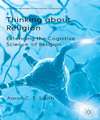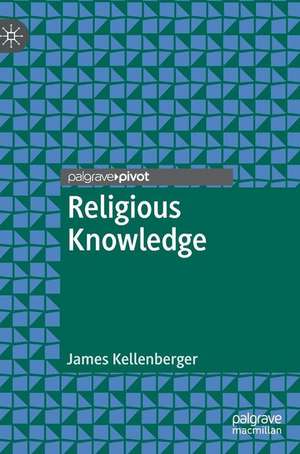Religious Knowledge: Palgrave Frontiers in Philosophy of Religion
Autor James Kellenbergeren Limba Engleză Hardback – 2 dec 2022
This book addresses the place of religious knowledge in religion, particularly within Christianity. The book begins by examining the difference between the general concepts of knowledge and belief, the relation between faith and knowledge, and reasons why belief as faith, and not knowledge, is central to the Abrahamic religions.
The book explores the ambivalence about religious knowledge within Christianity. Some religious thinkers explicitly accepted and sought religious knowledge, as did St. Thomas Aquinas, while others, notably Søren Kierkegaard, cast knowledge and seeking it as incompatible with faith. The book also examines two antithetical religious intuitions about knowledge, both at home in the Christian tradition. For one, faith requires a struggle with doubt. For the other, faith requires a certainty that excludes doubt. For the first, religious knowledge would destroy faith. For the second, religious knowledge is compatible with faith and completes it.
Though the book focuses on the Christian tradition, it also considers other traditions, including a chapter on the place of religious knowledge in nontheistic religious traditions. The final chapter examines how coming to Wisdom as personified in the Jewish and Christian traditions may be distinct from attaining religious knowledge.Din seria Palgrave Frontiers in Philosophy of Religion
- 20%
 Preț: 691.33 lei
Preț: 691.33 lei - 15%
 Preț: 522.56 lei
Preț: 522.56 lei - 18%
 Preț: 727.18 lei
Preț: 727.18 lei -
 Preț: 391.61 lei
Preț: 391.61 lei - 18%
 Preț: 725.43 lei
Preț: 725.43 lei -
 Preț: 380.07 lei
Preț: 380.07 lei -
 Preț: 391.61 lei
Preț: 391.61 lei - 15%
 Preț: 641.53 lei
Preț: 641.53 lei - 18%
 Preț: 727.18 lei
Preț: 727.18 lei -
 Preț: 386.99 lei
Preț: 386.99 lei - 15%
 Preț: 634.82 lei
Preț: 634.82 lei -
 Preț: 263.45 lei
Preț: 263.45 lei -
 Preț: 357.63 lei
Preț: 357.63 lei -
 Preț: 386.81 lei
Preț: 386.81 lei - 18%
 Preț: 786.66 lei
Preț: 786.66 lei -
 Preț: 452.03 lei
Preț: 452.03 lei -
 Preț: 387.75 lei
Preț: 387.75 lei -
 Preț: 381.98 lei
Preț: 381.98 lei -
 Preț: 382.18 lei
Preț: 382.18 lei -
 Preț: 386.81 lei
Preț: 386.81 lei - 18%
 Preț: 789.20 lei
Preț: 789.20 lei - 15%
 Preț: 524.88 lei
Preț: 524.88 lei -
 Preț: 482.17 lei
Preț: 482.17 lei - 15%
 Preț: 529.92 lei
Preț: 529.92 lei - 18%
 Preț: 787.61 lei
Preț: 787.61 lei - 18%
 Preț: 722.12 lei
Preț: 722.12 lei -
 Preț: 387.96 lei
Preț: 387.96 lei -
 Preț: 393.52 lei
Preț: 393.52 lei - 18%
 Preț: 1122.42 lei
Preț: 1122.42 lei -
 Preț: 391.61 lei
Preț: 391.61 lei
Preț: 350.12 lei
Nou
Puncte Express: 525
Preț estimativ în valută:
67.00€ • 69.69$ • 55.32£
67.00€ • 69.69$ • 55.32£
Carte tipărită la comandă
Livrare economică 12-26 aprilie
Preluare comenzi: 021 569.72.76
Specificații
ISBN-13: 9783031187865
ISBN-10: 3031187865
Pagini: 118
Ilustrații: VI, 118 p.
Dimensiuni: 148 x 210 mm
Greutate: 0.3 kg
Ediția:1st ed. 2023
Editura: Springer International Publishing
Colecția Palgrave Macmillan
Seria Palgrave Frontiers in Philosophy of Religion
Locul publicării:Cham, Switzerland
ISBN-10: 3031187865
Pagini: 118
Ilustrații: VI, 118 p.
Dimensiuni: 148 x 210 mm
Greutate: 0.3 kg
Ediția:1st ed. 2023
Editura: Springer International Publishing
Colecția Palgrave Macmillan
Seria Palgrave Frontiers in Philosophy of Religion
Locul publicării:Cham, Switzerland
Cuprins
Chapter 1: Introduction.- Chapter 2: Knowledge and Belief.- Chapter 3: Religious Ambivalence in the Christian Tradition About Knowledge.- Chapter 4: Curiosity and Scientific Knowledge in Opposition To Religious Knowledge.- Chapter 5: Aquinas and Kierkegaard.- Chapter 6: The Neo-Wittgensteinian Treatment of Religious Knowledge.- Chapter 7: Kierkegaard’s Two Treatments of Religious Knowledge.- Chapter 8: Faith and Knowledge.- Chapter 9: Religious Knowledge in Nontheistic Traditions.- Chapter 10: Religious Knowledge and Religious Wisdom.
Notă biografică
The late James Kellenberger was Emeritus Professor of Philosophy at California State University, Northridge, USA. Professor Kellenberger's other books include Kierkegaard and Nietzsche (1997), Dying to Self and Detachment (2012), and most recently Religious Revelation (2021).
Textul de pe ultima copertă
This book addresses the place of religious knowledge in religion, particularly within Christianity. The book begins by examining the difference between the general concepts of knowledge and belief, the relation between faith and knowledge, and reasons why belief as faith, and not knowledge, is central to the Abrahamic religions.
The book explores the ambivalence about religious knowledge within Christianity. Some religious thinkers explicitly accepted and sought religious knowledge, as did St. Thomas Aquinas, while others, notably Søren Kierkegaard, cast knowledge and seeking it as incompatible with faith. The book also examines two antithetical religious intuitions about knowledge, both at home in the Christian tradition. For one, faith requires a struggle with doubt. For the other, faith requires a certainty that excludes doubt. For the first, religious knowledge would destroy faith. For the second, religious knowledge is compatible with faith and completes it.
Though the book focuses on the Christian tradition, it also considers other traditions, including a chapter on the place of religious knowledge in nontheistic religious traditions. The final chapter examines how coming to Wisdom as personified in the Jewish and Christian traditions may be distinct from attaining religious knowledge.The late James Kellenberger was Emeritus Professor of Philosophy at California State University, Northridge, USA. Professor Kellenberger's other books include Kierkegaard and Nietzsche (1997), Dying to Self and Detachment (2012), and most recently Religious Revelation (2021).
Caracteristici
Examines how religious knowledge is to be considered religiously Asks what is the significance of religious knowledge for faith Maintains that personification in religion allows relationships that are not reducible to knowing truths
